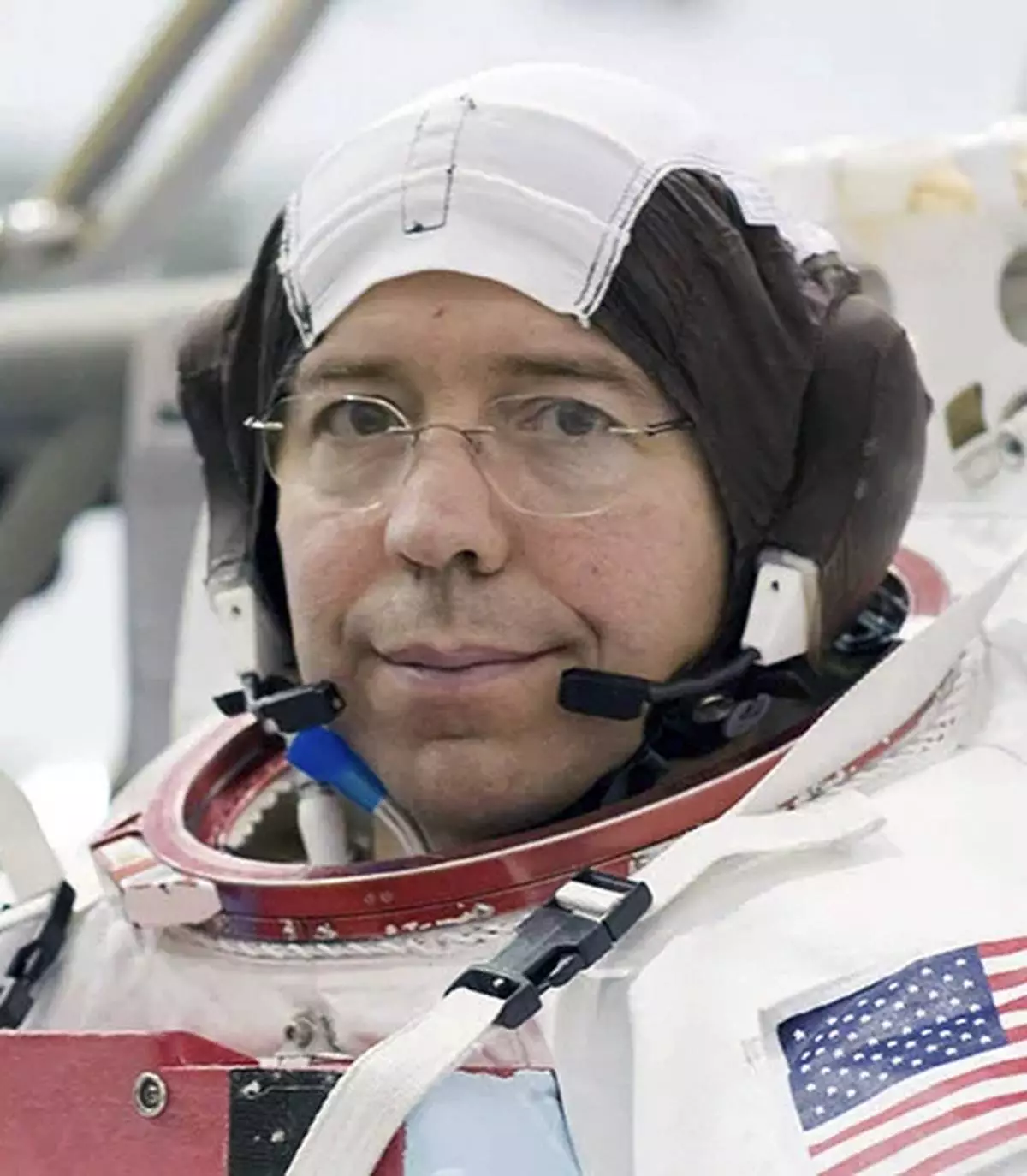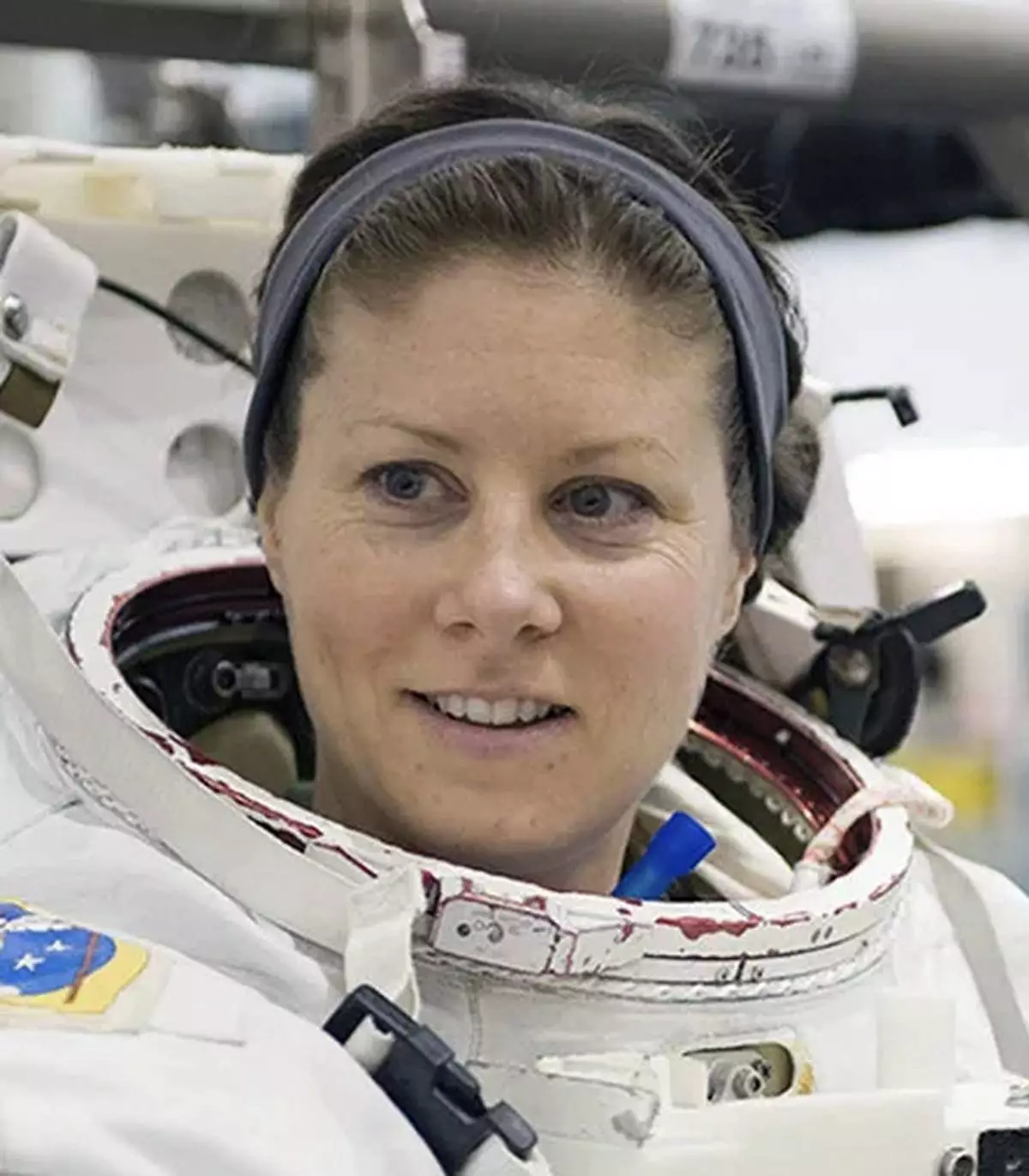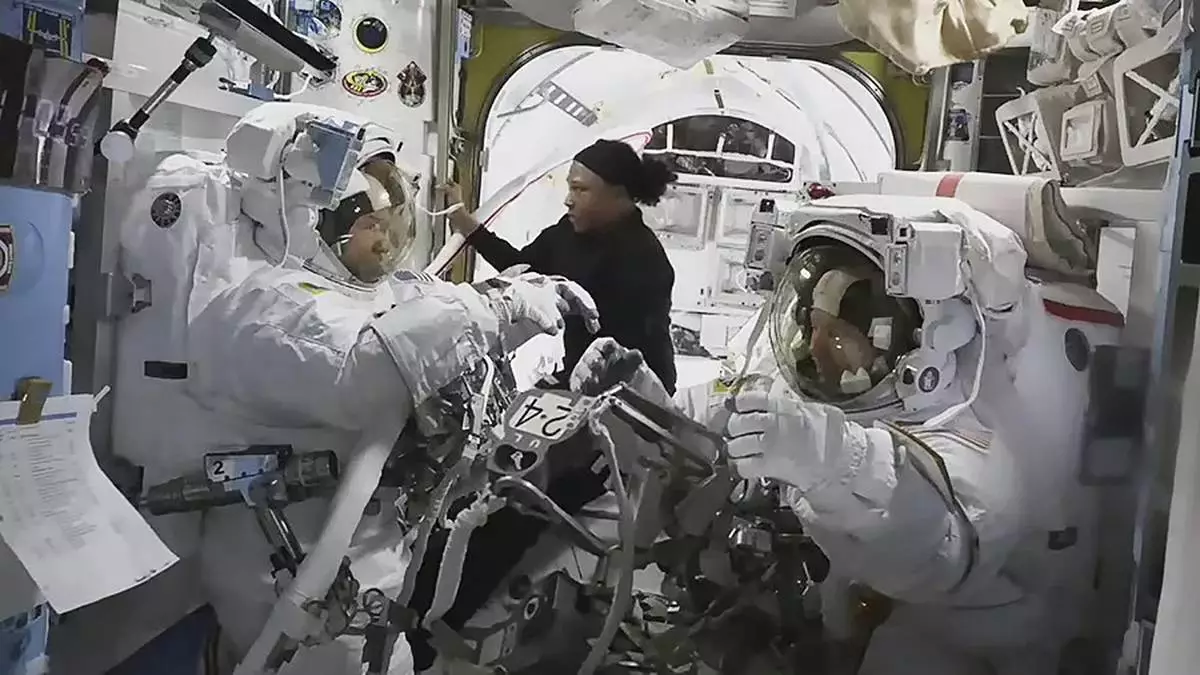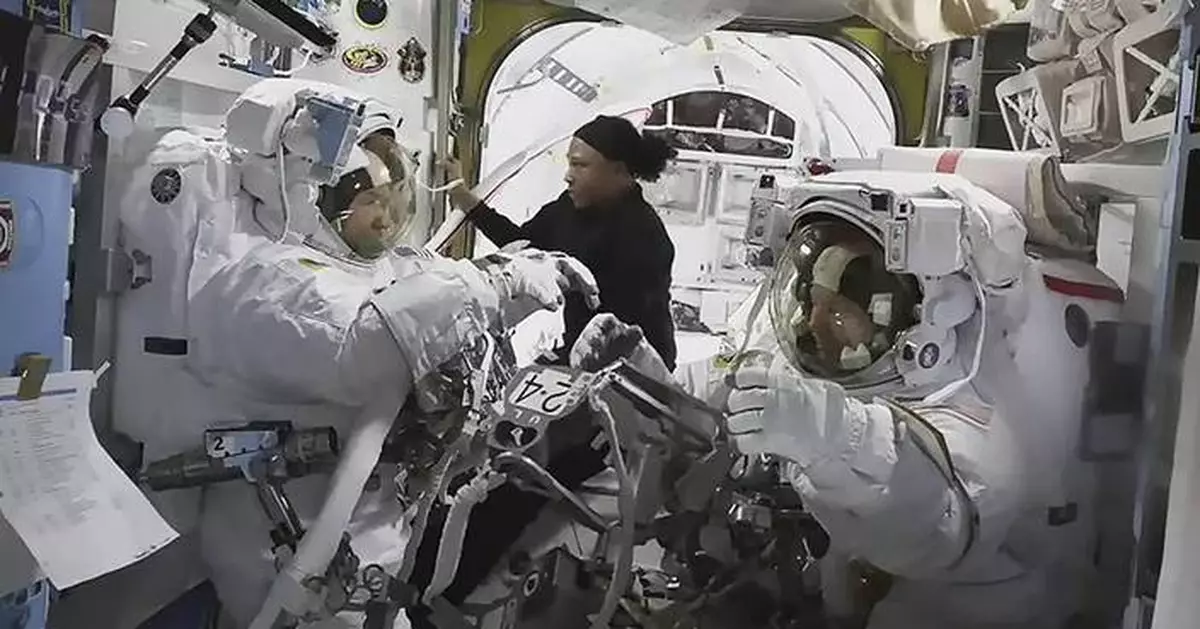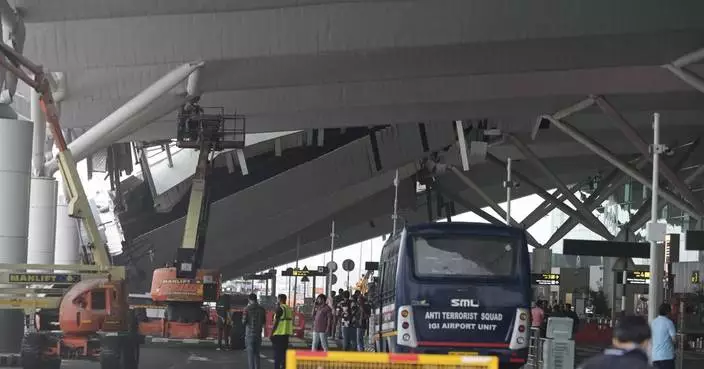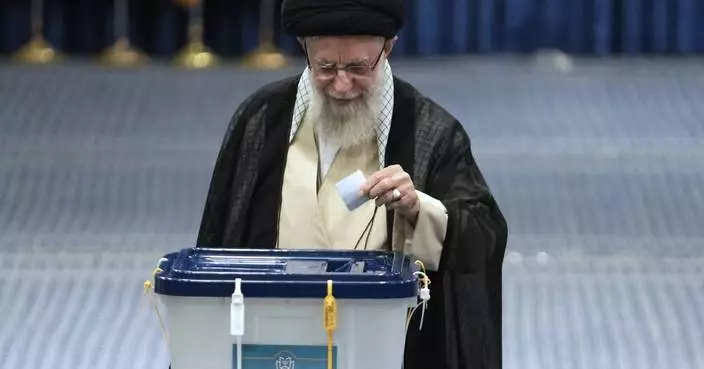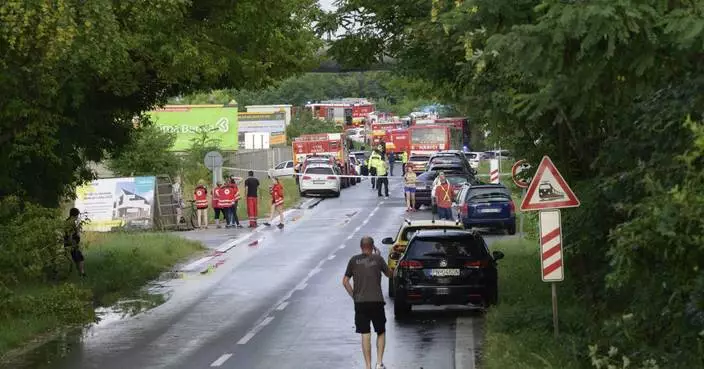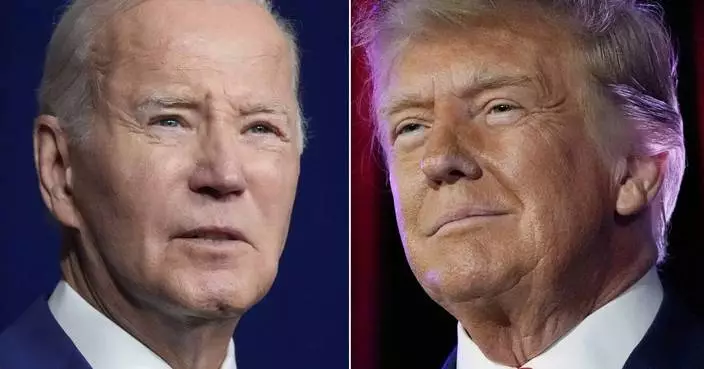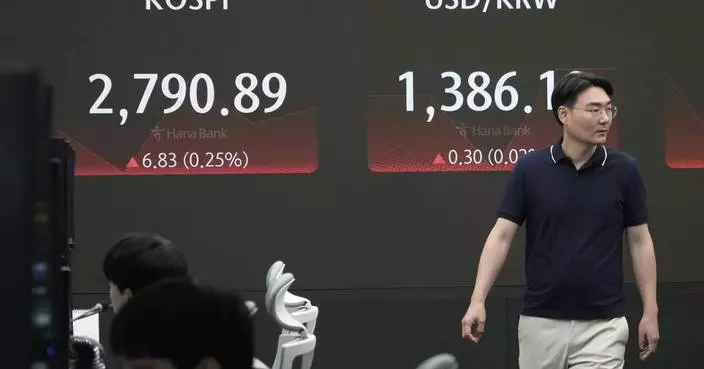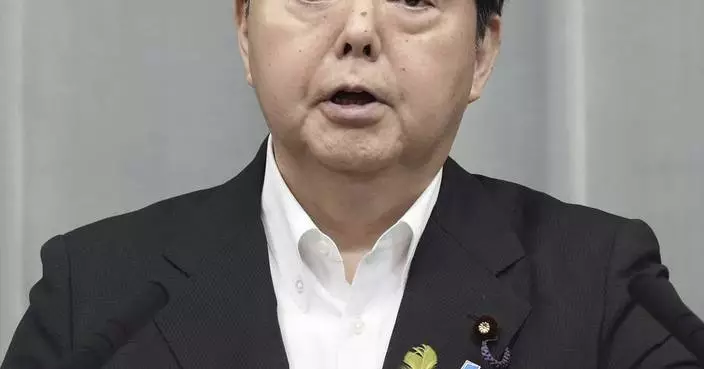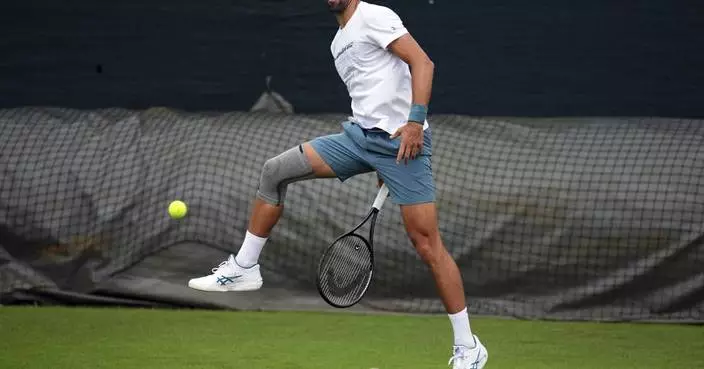Iranians are voting on Friday to replace the late President Ebrahim Raisi, who was killed in a May helicopter crash in the country's northwest along with the foreign minister and several other officials.
Analysts broadly describe the race as a three-way contest. There are two hard-liners, former nuclear negotiator Saeed Jalili and the parliament speaker, Mohammad Bagher Qalibaf. Then there’s the reformist candidate Masoud Pezeshkian, who has aligned himself with those seeking a return to the 2015 nuclear deal with world powers.
After record-low turnout in recent elections, it remains unclear how many Iranians will take part in Friday’s poll.
While 85-year-old Supreme Leader Ayatollah Ali Khamenei has final say on all matters of state, presidents can bend Iran toward confrontation or negotiations with the West.
Currently:
— As Iran’s presidential vote looms, tensions boil over regarding a renewed headscarf crackdown.
— An analysis explores how no matter who wins Iran’s election, much may hinge for Tehran on the ‘Great Satan,’ the United States.
— A “Hamster” cryptocurrency craze gripping Iran highlights its economic malaise.
— A timeline explores the longtime tensions over Iran’s nuclear program.
— Iran’s imprisoned Nobel Peace Prize laureate Narges Mohammadi, who already called for a boycott of the vote, is been sentenced to another year in prison.
— Follow AP’s coverage of the Iranian presidential election at https://apnews.com/hub/iran.
Here is the latest:
Authorities in Iran are seeking to encourage people to vote in Friday's presidential elections with news videos and images.
A video by an Iranian news channel, yjc.ir, showed people lining up in the southeastern city of Kerman to vote in a polling station next to the grave of Gen. Qassim Soleimani, who was killed in a 2020 U.S. drone attack. Soleimani, a top military commander, was widely seen as a popular figure of national resilience in the face of four decades of U.S. pressure.
Other images showed that Iran's religious minorities, including Iranian Christians and Jewish leaders, are also taking part in the vote.
More than 61 million Iranians over the age of 18 are eligible to vote, but turnout is expected to be low amid growing public apathy after years of economic woes, mass protests and tensions in the Middle East.
Dozens of supporters have gathered around hard-line candidate Saeed Jalili as he cast his vote at a ballot station in south of Tehran, chanting “we are proud of Jalili."
The 58-year-old Jaili, a hard-line politician and former senior nuclear negotiator, smiled as supporters surrounded him and tried to shake his hand. He did not make any speech after voting. Mohammad Bagher Qalibaf, the Speaker of Parliament and the highest-ranking official within the theocracy to be seeking the presidency, also cast his vote in the south of Tehran. He then visited the grave of the country’s late foreign minister, Hossein Amirabdollahian, who died in a helicopter crash that killed President Ebrahim Raisi in May.
DAMASCUS, Syria — In the Syrian capital of Damascus, voters trickled into the Iranian embassy Thursday morning. Iranian Ambassador Hossein Akbari said seven polling stations have been set up in Damascus and others throughout the country, where an estimated 12,000 Iranian citizens live.
“Iranians have been living in Syria for a long time, possibly up to four generations ago,” Akbari said. “Many of them do not even master the Farsi language, but they participate significantly in these elections.”
Akbari paid tribute to the memory of late President Ebrahim Raisi, who died in a helicopter crash in May, and said that Iran is ready to “renew our pledge and loyalty to the blood of the martyrs in Syria.” Iran, along with Russia, is the strongest ally of the government of Syrian President Bashar Assad and its intervention helped to turn the tide of the Syrian civil war.
Sadegh Ramadani, 60, a professor of Farsi at Damascus University, 60, who voted in the embassy, said the election after Raisi’s death is “extremely important,”
“The participation of people ... from across the spectrum, all ethnicities and sects is very important and will raise our voice to the world,” he said. “There is really real competition between Islamists and reformists.”
The sole reformist running in Iran’s presidential election told journalists after voting: “God willing, we will try to have friendly relations with all countries except Israel.”
The remark by Masoud Pezeshkian, a 69-year-old heart surgeon who seeks a return to the atomic accord and better relations with the West, came after he faced a thinly veiled warning from Iran’s Supreme Leader Ayatollah Ali Khamenei over his outreach to the United States.
With the comment, Pezeshkian signals his effort to energize those who want more engagement with the West after the collapse of the country’s 2015 nuclear deal with world powers. However, close ties to the West — particularly the U.S. — would be anathema to the hard-liners he faces.
BAGHDAD — Iranian residents of Iraq and pilgrims visiting Shiite religious shrines cast votes Friday at the country’s six Iranian consulates in federal Iraq and the semi-autonomous Kurdish region in the north, and at mobile voting stations in other areas of the country.
“We have fixed centers, consulates and mobile polling stations that go to (Iranian) workers in companies operating in Iraq,” said Mohammad Kazem Al-Sadegh, Iran’s ambassador to Iraq. “Even some prisoners who are present have coordinated with the government so that they can cast their votes. The electoral process will go smoothly today, God willing.”
Baghdad has close relations with Tehran, and current Prime Minister Mohammed Shia al-Sudani came to power with the support of a coalition of pro-Iran factions. At the same time, Iraq has attempted to maintain good economic and military relations with Washington.
That balance has become increasingly difficult over the past nine months against the backdrop of the Israel-Hamas war in Gaza. Iranian-backed Iraqi militias have launched drone attacks against U.S. bases in Iraq and Syria and targets in Israel.
Candidate Mostafa Pourmohammadi, the only Shiite cleric running, cast his vote in Tehran and expressed hope for high turnout.
Pourmohammadi, who served as interior minister under hard-line President Mahmoud Ahmadinejad and later as justice minister under relative moderate President Hassan Rouhani, said “We hope that our people turn today into one of the best days in their history with a good choice and high turnout."
In 2006, the United States State Department declared Pourmohammadi a “notorious human rights violator,” accusing him of playing a leading role in the mass execution of several thousand political prisoners at Tehran’s notorious Evin prison in 1988. The State Department also linked him to the so-called “chain murders” of activists and others in the 1990s.
He’s insisted the next president must deal with the world and criticized Iran’s arming of Russia in the war in Ukraine — not because the weapons are used to kill of civilians, but because he felt Tehran isn't getting enough back from Moscow for its support.
His campaign is likely counting on the backing of clerics and traditionalists.
As Iranian state TV showed people lined up to vote, most of the polling stations The Associated Press visited in early hours of voting — mostly on the north side of Tehran — were not crowded.
Mahmoud Darrehei, a 49-year-old teacher, said he voted for heart surgeon Masoud Pezeshkian, the only reformist candidate in the race. “This is the first time I've voted since 2005," adding that he saw Pezeshkian as able to solve problems caused by years of hard-line governments.
At another polling station, Maryam Aalipour, 32, a mother of two clad head-to-toe in a black veil, said she voted for hard-line former nuclear negotiator Saeed Jalili. “He is the cleanest candidate in the election. He knows all problems of the country and he is able to resist the U.S. pressures," she said.
Aria Rahimi, a 37-year-old who runs in a shop in Tehran's upmarket Mandela Street, said he voted for Mohammad Bagher Qalibaf, the speaker of parliament. “I voted for Qalibaf before opening the shop," he said. "We need a president who has experience in managing some important body like parliament or police. Qalibaf is the best among them in this regard."
As voters cast ballots in Iran’s presidential election, some are sharing their thoughts with The Associated Press.
Toosi, who gave only his first name, said he would cast his ballot for someone “who listens to the leader, is revolutionary and is loyal to the principles of the revolution.”
"Someone who’s not focused on the West, but focusing on our domestic capacities, on our youth," he added. “Someone who is obsessed about the people and has plans for future and has a very good track record.”
Toosi’s comments tracked with what others supporting a hard-line view have said in the campaign.
Another voter, who gave his name as Ghoochian, said he backed Masoud Pezeshkian, the race’s sole reformist candidate.
“I’ve know him for years,” the man said. “His stances, honesty and wholesomeness make him the best option. That’s why I voted for him.”
A former Iranian foreign minister who reached the 2015 nuclear deal with world powers has offered a positive assessment of the chances of the sole reformist candidate in Iran’s presidential election.
Mohammad Javad Zarif spoke Friday at a polling station in Tehran after casting his ballot. Zarif has been a key advocate for the heart surgeon Masoud Pezeshkian, who faces three hard-liners in the election.
“Hopefully, people will go and choose for themselves, and hopefully, if there is a large turnout, it will become clear who is the majority and who is the minority,” Zarif said.
Zarif also quoted what he said was a foreign proverb abroad, that bad politicians are elected by good people who do not vote. “Now is an opportunity to vote,” he added.
Zarif and Pezeshkian received a thinly veiled warning from Supreme Leader Ayatollah Ali Khamenei earlier in the week over their desire to negotiate with the West, particularly the United States.
Iran’s acting president Mohammad Mokhber has cast his vote and said that there are no security concerns in election.
“We have no security concerns for the elections,” Mokhber said in comments aired by state television. “The polling stations and its branches are properly placed in such a way that there is no point in the country or even outside the country where voting is not possible.”
Mokhber has served as acting president in the wake of the May helicopter crash that killed President Ebrahim Raisi. He was Raisi’s first vice president, but did not apply to run in the election.
Iran’s supreme leader called on the public to vote in the snap election to replace hard-line President Ebrahim Raisi, who died in a helicopter crash in May.
Ayatollah Ali Khamenei gave brief remarks Friday, speaking to journalists gathered in Tehran to cover him voting.
“I don’t see any reason for doubt,” Khamenei said at the ceremony in a mosque attached to his offices.
Khamenei said a high turnout was a “definite need” for the Islamic Republic. He also called the election an “important political test.”
Raisi, 63, had been seen as a protégé of Khamenei and a possible successor for the supreme leader position in Iran, which has final say over all matters of state in the Shiite theocracy.
Any Iranian 18 or older can vote in Friday’s election. There are 58,640 polling centers around the country, set up in mosques, schools and other public buildings. A voter first needs to show their national ID card and fill out a form. They then dip an index fingers in ink, making a print on the form, while officials stamp their ID so they can’t vote twice. On the secret ballot, a voter writes down the name and the numerical code of the candidate they are voting for and drops it into a ballot box. Voting lasts from 8 a.m. until 6 p.m., though authorities routinely keep polls open at least several hours later.
Iranian presidents serve four-year terms and are limited to serving two terms. Iran’s president is subordinate to the supreme leader and over the recent years, the supreme leader’s power appears to have grown stronger amid tensions with the West. However, a president can bend the state’s policies on both domestic issue and foreign affairs. Former President Hassan Rouhani, for example, struck the 2015 nuclear deal with world powers with the blessing of Supreme Leader Ayatollah Ali Khamenei. The hard-line tact taken by the late President Ebrahim Raisi also had Khamenei’s backing.
Iran describes itself as an Islamic Republic. The Shiite theocracy holds elections and has elected representatives passing laws and governing on behalf of its people. However, the supreme leader has the final say on all state matters and the Guardian Council must approve all laws passed by the parliament. Those who led Iran’s Green Movement after hard-line President Mahmoud Ahmadinejad’s disputed 2009 re-election remain under house arrest. Security forces answering only to the supreme leader also routinely arrest dual nationals and foreigners, using them as pawns in international negotiations. Mass protests in recent years have seen bloody crackdowns on dissent. Meanwhile, hard-liners now hold all levers of power within the country. The Guardian Council approves all candidates and also has never allowed a woman to run for president. It routinely rejects candidates calling for dramatic reform, stifling change.
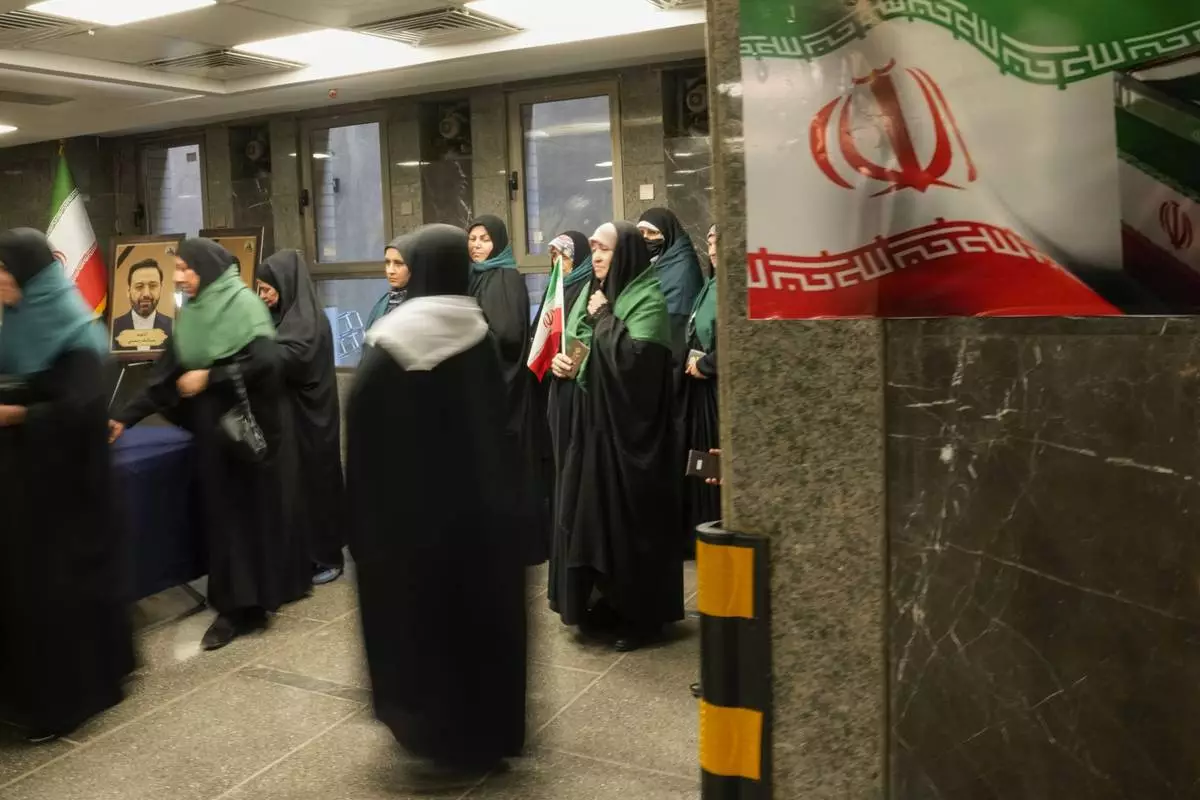
Iranian citizens gather to cast their votes during the presidential election at a polling station inside the Iranian embassy in Baghdad, Iraq, Friday, June 28, 2024. Iranians are voting to replace the late President Ebrahim Raisi, killed in a helicopter crash in May along with the country's foreign minister and several other officials.(AP Photo/Hadi Mizban)
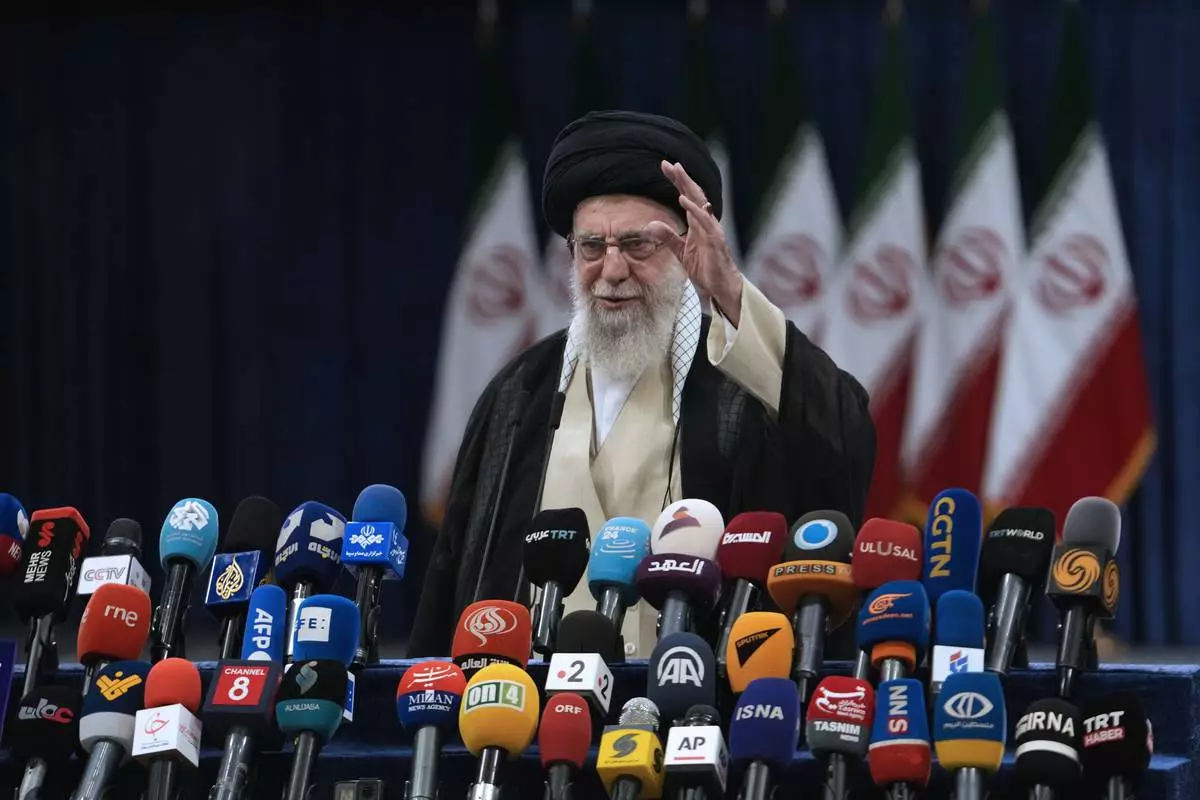
Iranian Supreme Leader Ayatollah Ali Khamenei waves to media after casting his vote during the presidential election in Tehran, Iran, Friday, June 28, 2024. Iranians were voting Friday in a snap election to replace the late President Ebrahim Raisi, killed in a helicopter crash last month, as public apathy has become pervasive in the Islamic Republic after years of economic woes, mass protests and tensions in the Middle East. (AP Photo/Vahid Salemi)
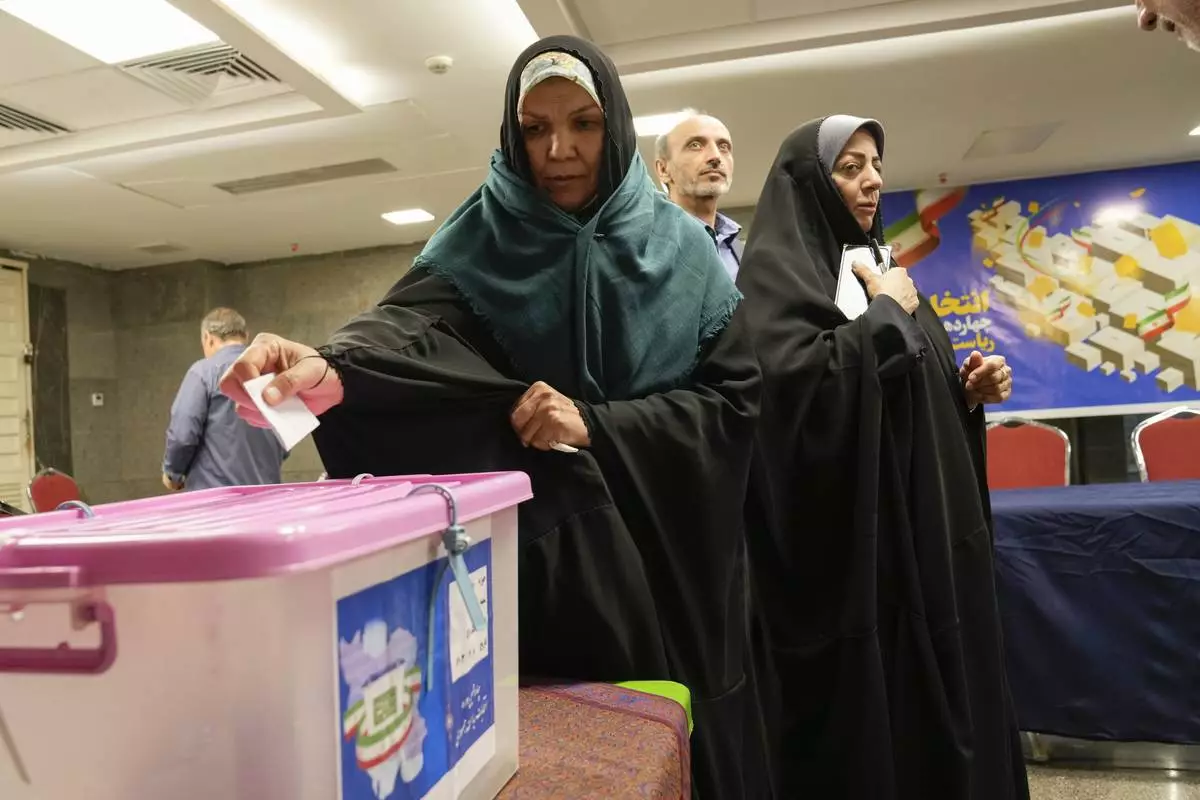
A woman casts her vote during the presidential election at a polling station inside the Iranian Embassy in Baghdad, Iraq, Friday, June 28, 2024. Iranians were voting Friday in a snap election to replace the late President Ebrahim Raisi, killed in a helicopter crash last month, as public apathy has become pervasive in the Islamic Republic after years of economic woes, mass protests and tensions in the Middle East. (AP Photo/Hadi Mizban)
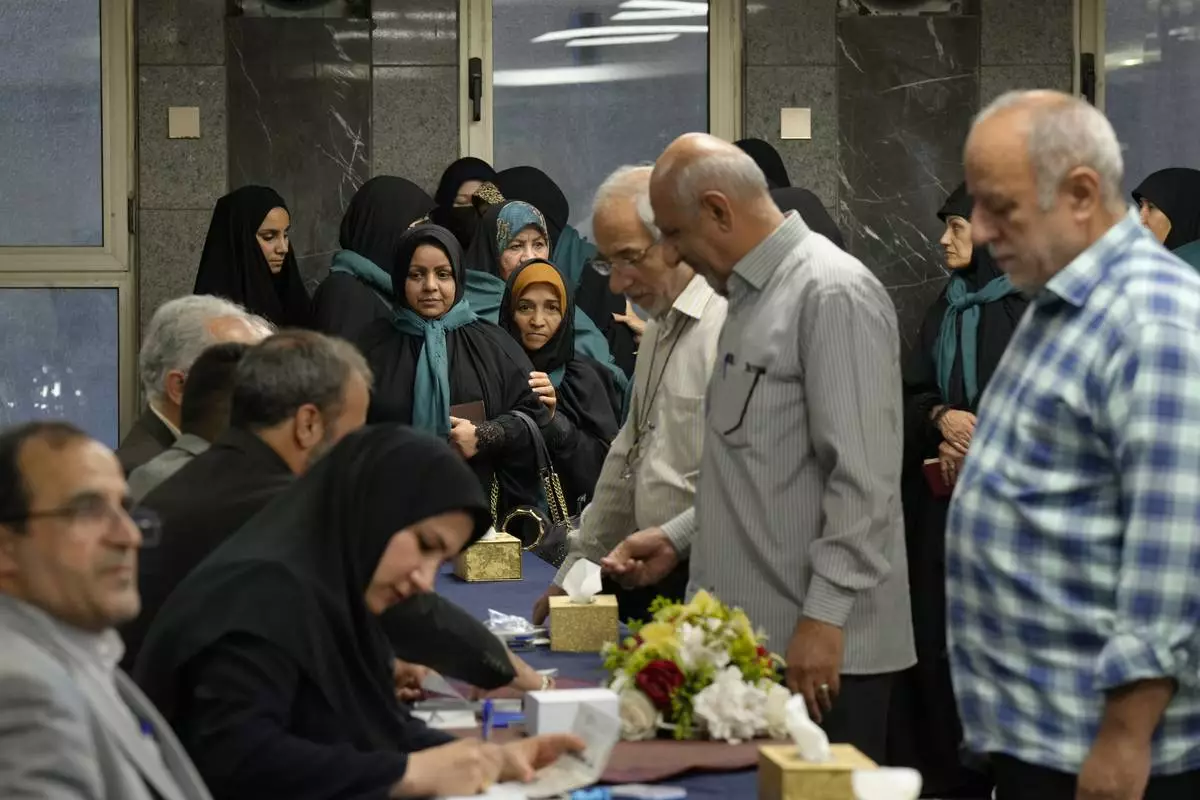
Iranian citizens wait in queue to cast their votes during the presidential election at a polling station inside the Iranian embassy in Baghdad, Iraq, Friday, June 28, 2024. Iranians are voting in a presidential election to replace the late President Ebrahim Raisi, killed in a helicopter crash in May along with the country's foreign minister and several other officials. (AP Photo/Hadi Mizban)
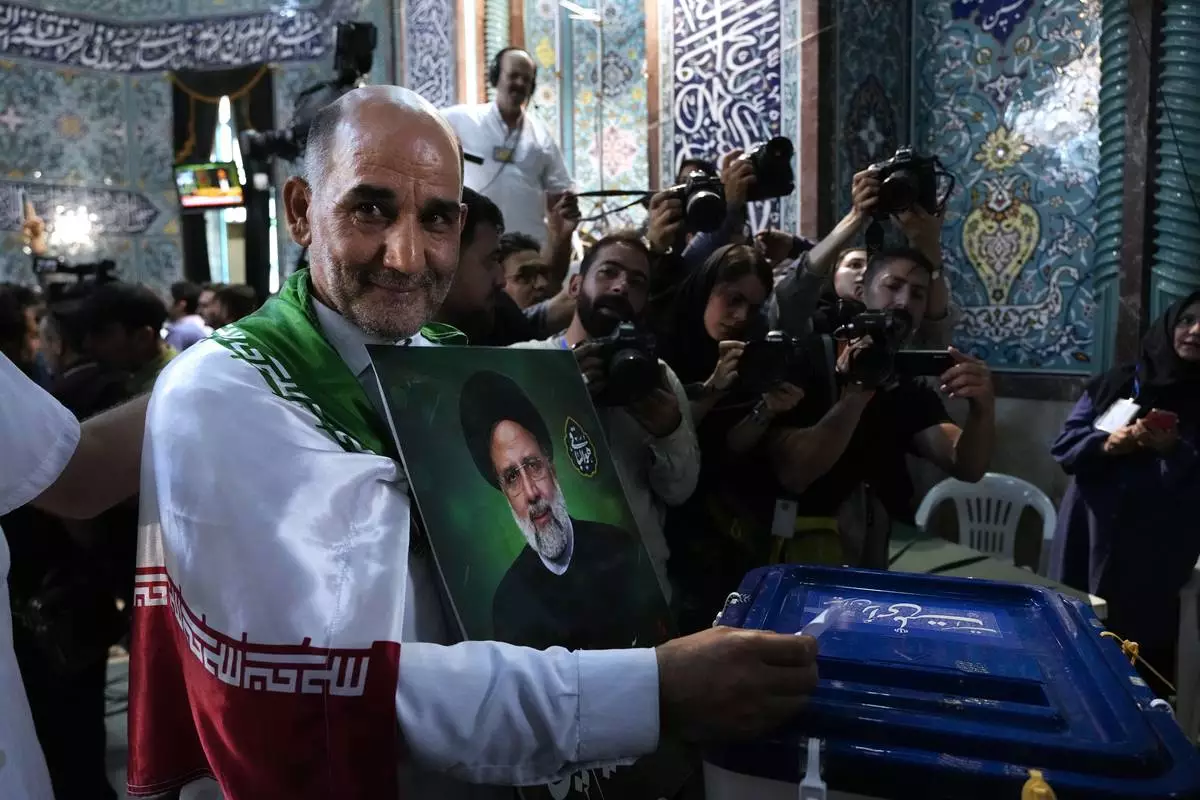
A man casts his ballot during the presidential election as he holds a picture of the late President Ebrahim Raisi in a polling station, in Tehran, Iran, Friday, June 28, 2024. Iranians were voting Friday in a snap election to replace the late President Ebrahim Raisi, killed in a helicopter crash last month, as public apathy has become pervasive in the Islamic Republic after years of economic woes, mass protests and tensions in the Middle East. (AP Photo/Vahid Salemi)
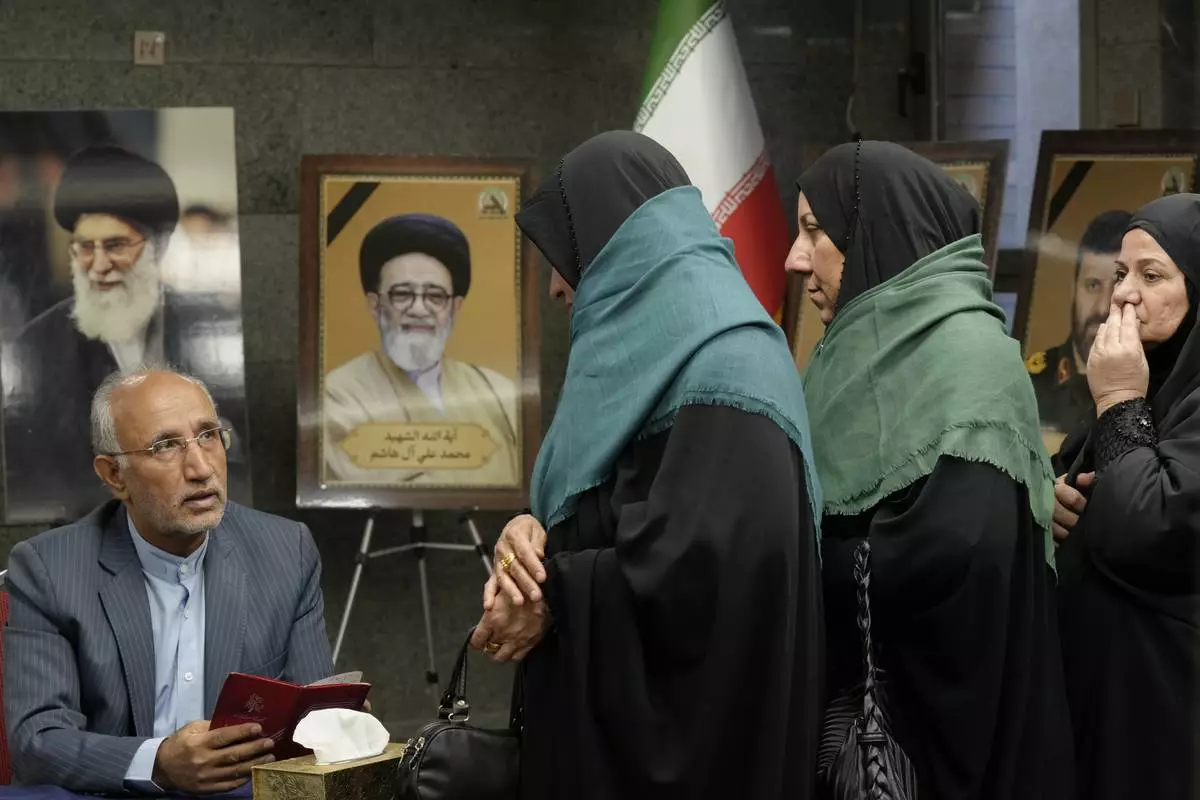
Iranian citizens wait in queue to cast their votes during the presidential election at a polling station inside the Iranian embassy in Baghdad, Iraq, Friday, June 28, 2024. Iranians are voting in a presidential election to replace the late President Ebrahim Raisi, killed in a helicopter crash in May along with the country's foreign minister and several other officials. (AP Photo/Hadi Mizban)
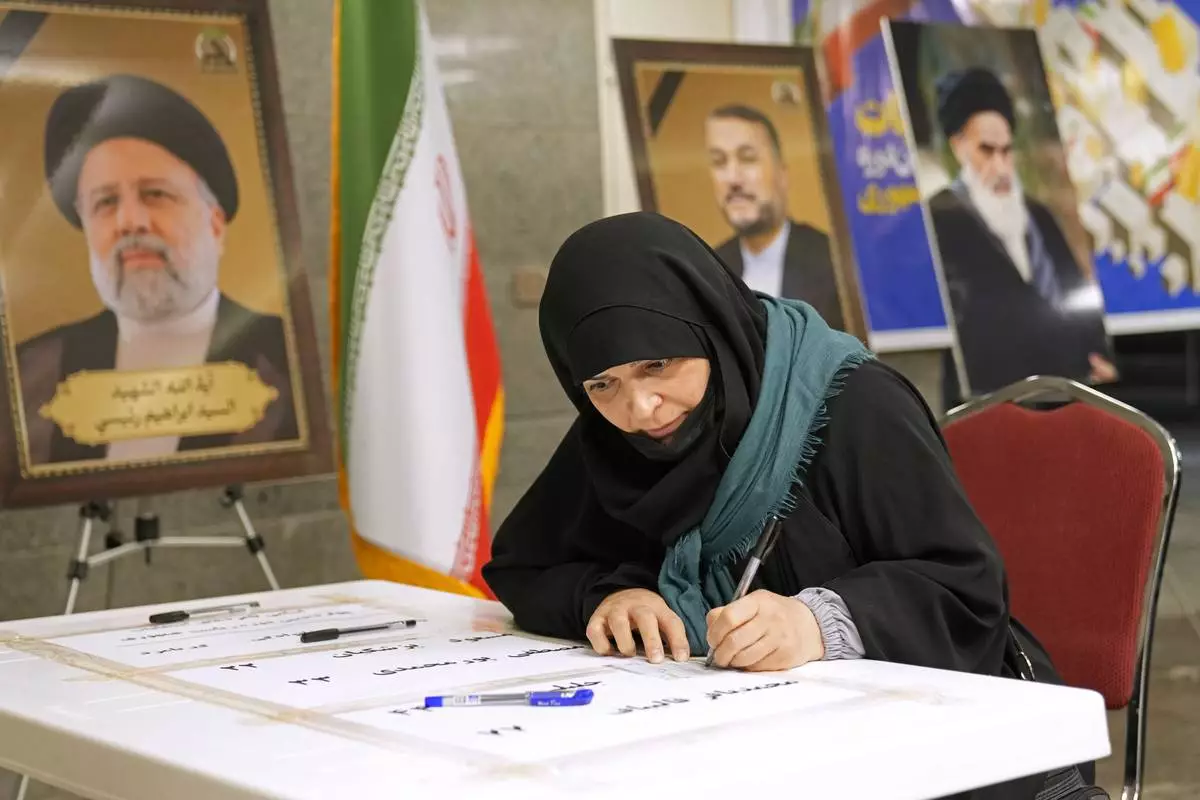
A woman casts her vote during the presidential election at a polling station inside the Iranian embassy in Baghdad, Iraq, Friday, June 28, 2024. (AP Photo/Hadi Mizban)
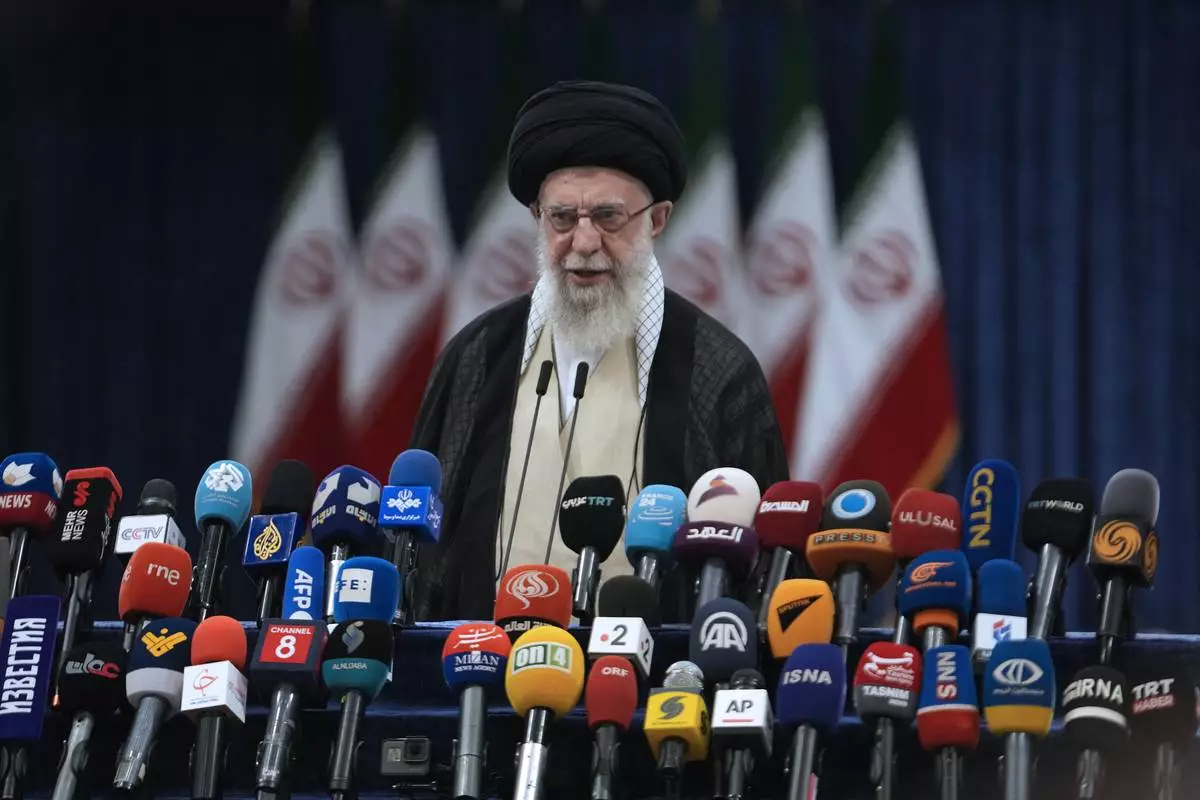
Iranian Supreme Leader Ayatollah Ali Khamenei speaks after casting his vote during the presidential election in Tehran, Iran, Friday, June 28, 2024. Iranians were voting Friday in a snap election to replace the late President Ebrahim Raisi, killed in a helicopter crash last month, as public apathy has become pervasive in the Islamic Republic after years of economic woes, mass protests and tensions in the Middle East. (AP Photo/Vahid Salemi)
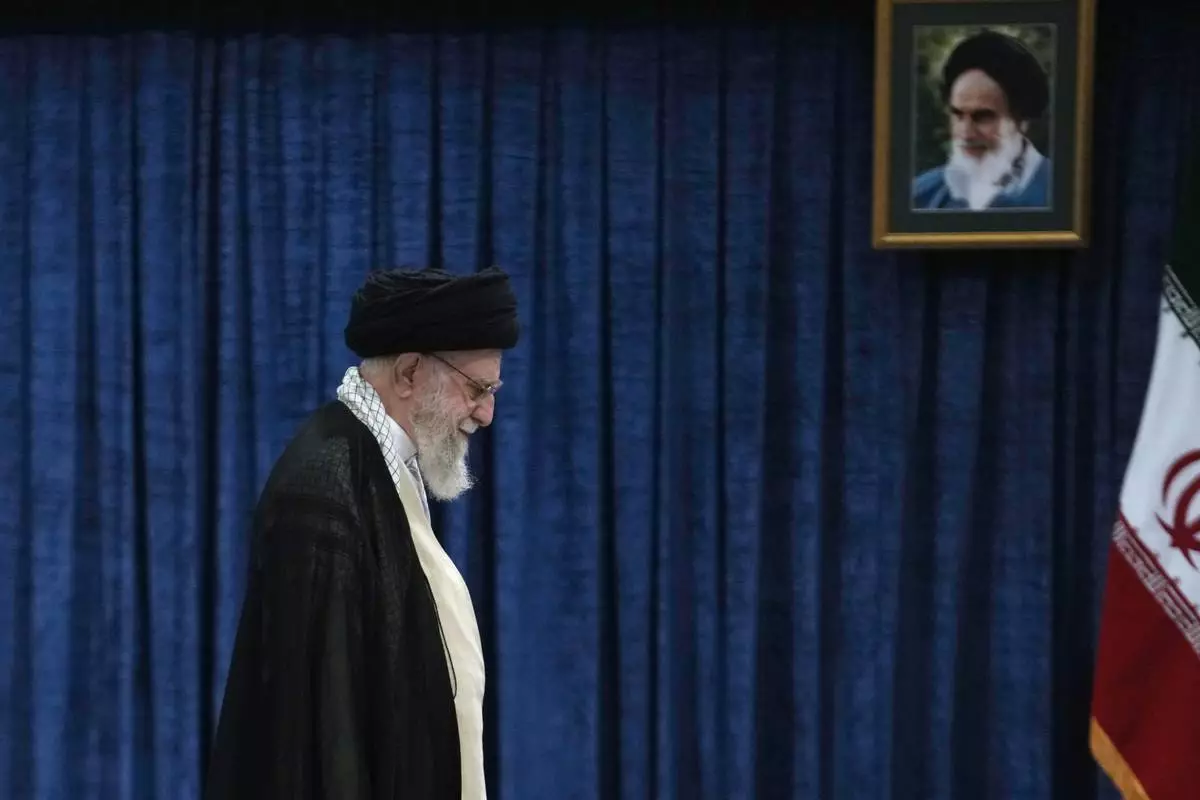
Iranian Supreme Leader Ayatollah Ali Khamenei leaves after casting his vote during the presidential election, in Tehran, Iran, Friday, June 28, 2024. Iranians were voting Friday in a snap election to replace the late President Ebrahim Raisi, killed in a helicopter crash last month, as public apathy has become pervasive in the Islamic Republic after years of economic woes, mass protests and tensions in the Middle East. (AP Photo/Vahid Salemi)
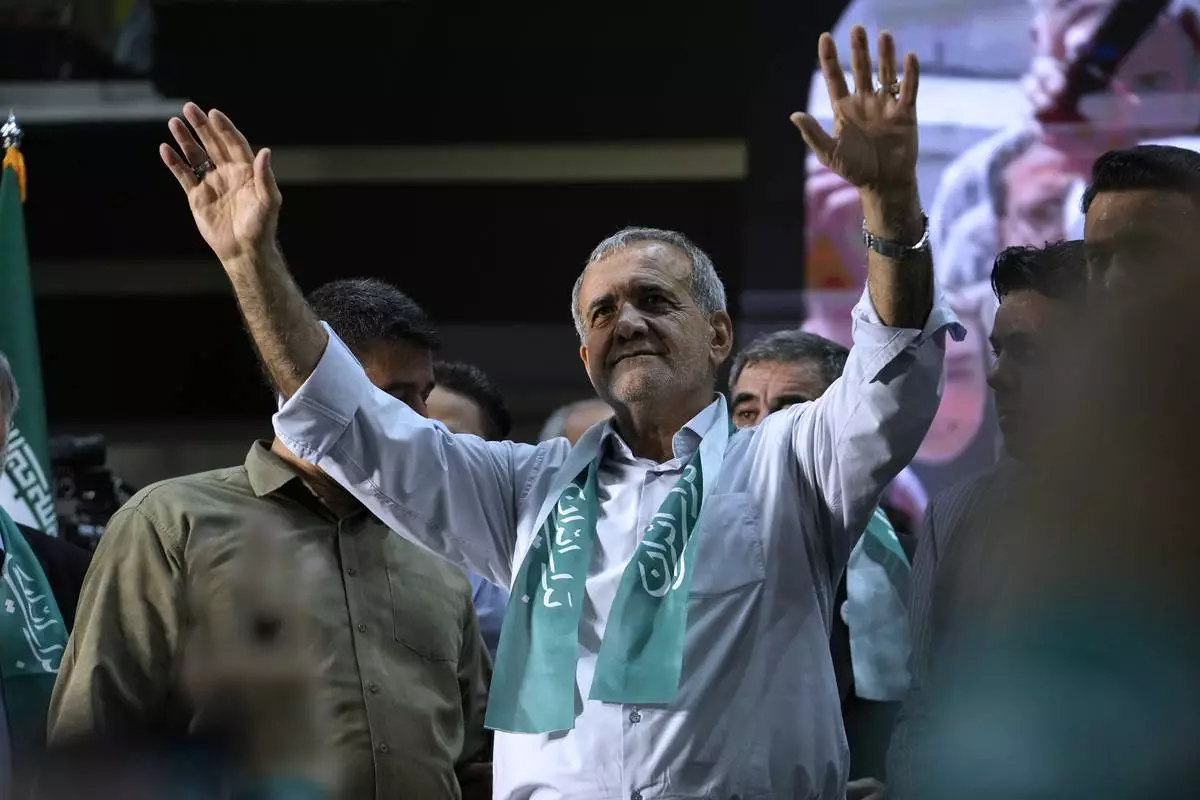
Reformist candidate for Iran's presidential election Masoud Pezeshkian waves to his supporters in his campaign meeting in Tehran, Iran, Sunday, June 23, 2024. (AP Photo/Vahid Salemi)
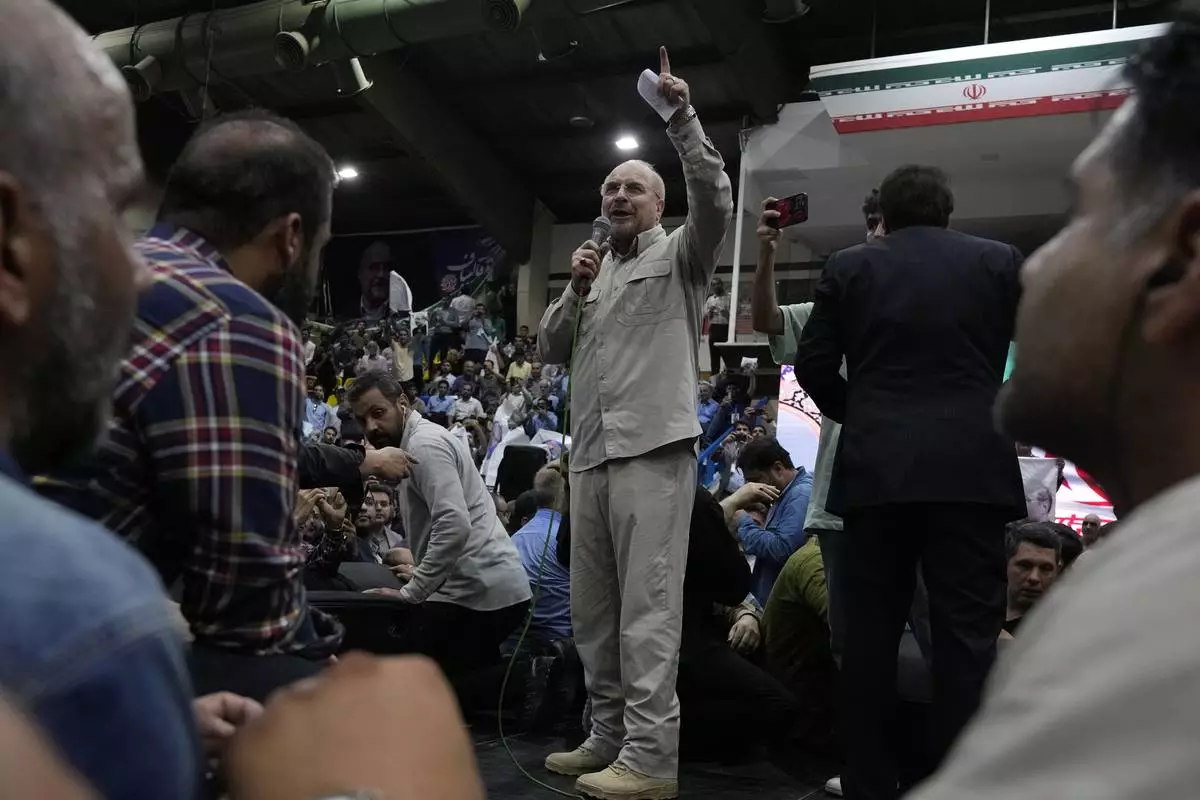
Iran's parliament speaker Mohammad Bagher Qalibaf, the most prominent hard-line candidate for the presidential election, speaks in his campaign gathering in Tehran, Iran, Wednesday, June 26, 2024. (AP Photo/Vahid Salemi)
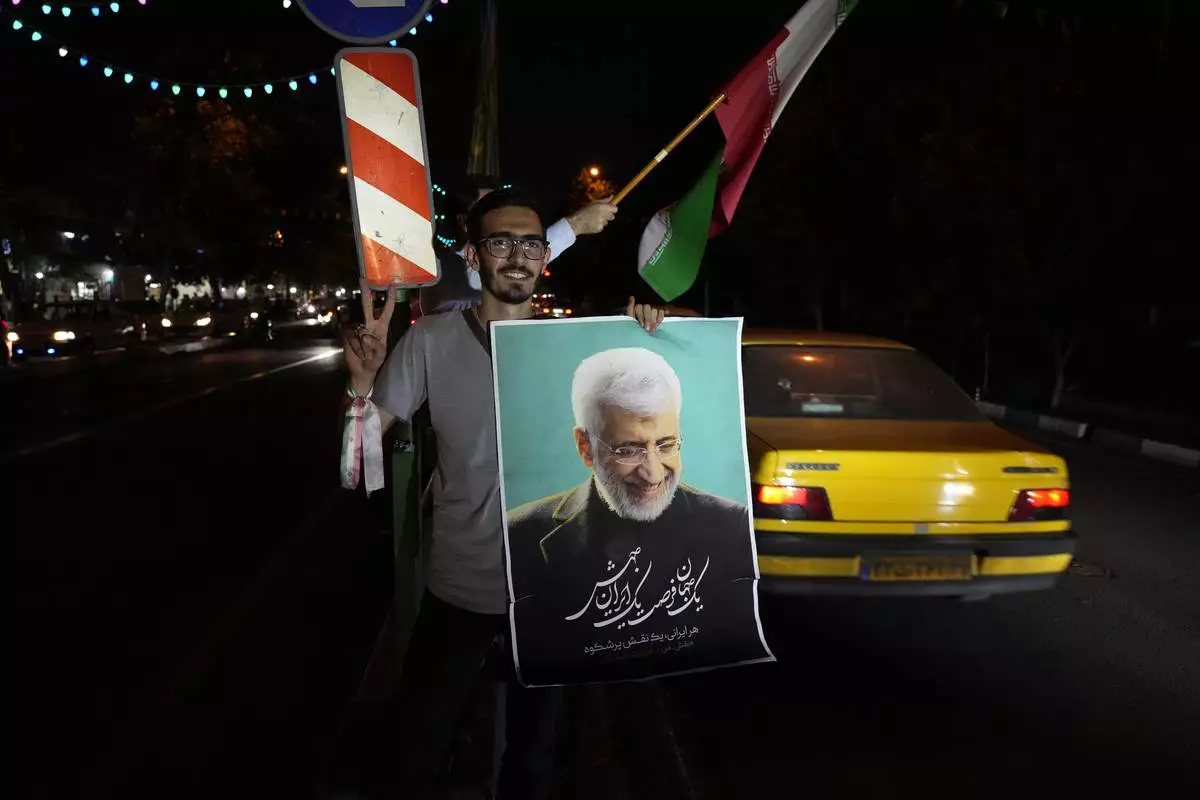
A supporter of Saeed Jalili, a candidate for the presidential election, holds his poster as he flashes a victory sign during a campaign gathering in Tehran, Iran, Wednesday, June 26, 2024. (AP Photo/Vahid Salemi)
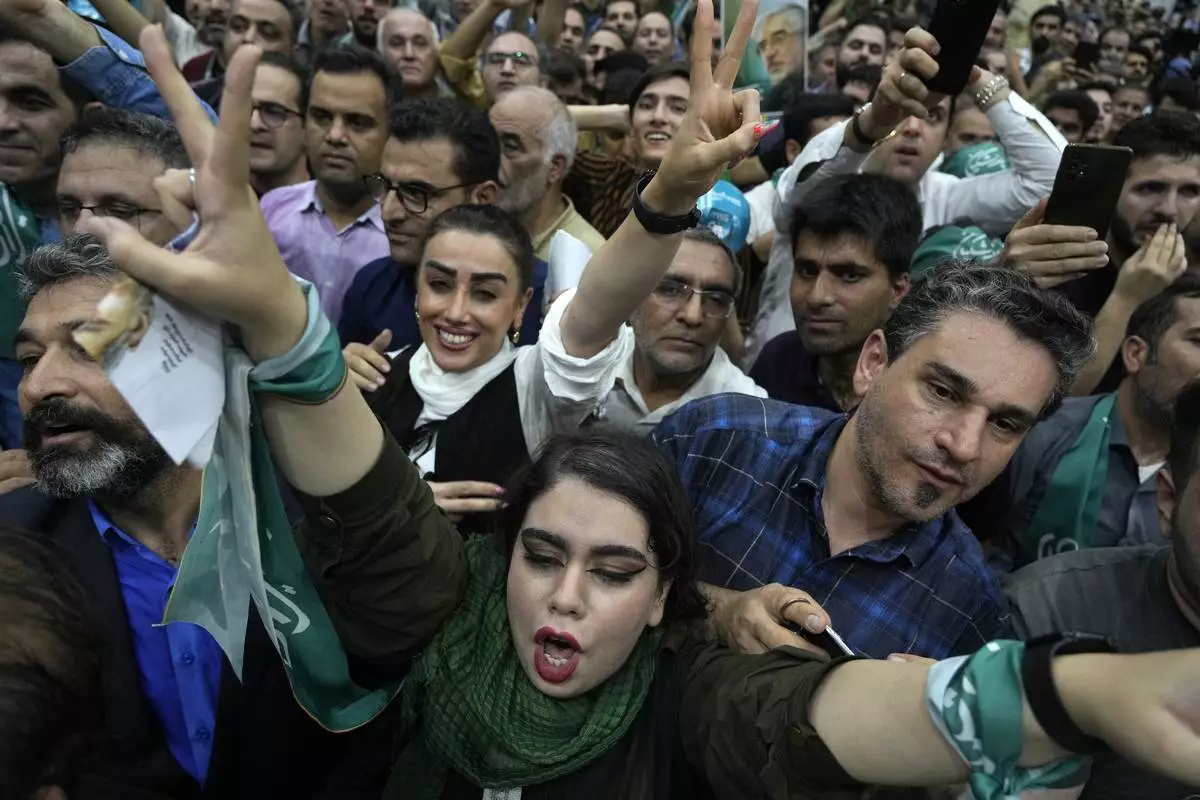
Supporters of reformist candidate for Iran's presidential election Masoud Pezeshkian attend his campaign meeting in Tehran, Iran, Sunday, June 23, 2024. (AP Photo/Vahid Salemi)
